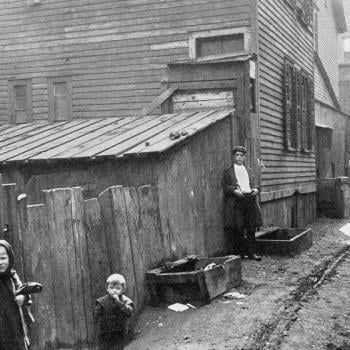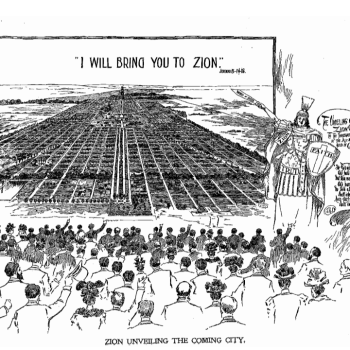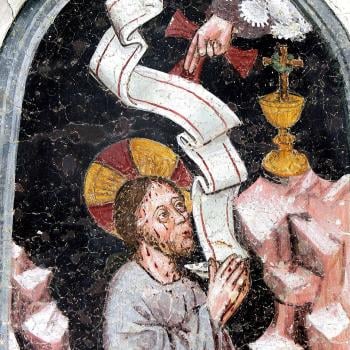
Pope Francis has been back in the news. Most recently, because the Vatican confirmed that he will visit the United States next year, but earlier because of the much-discussed extraordinary synod on the family. At this gathering, some prelates drafted a document evincing an unprecedented welcome to gays and divorced Catholics before it was criticized and ultimately shot down by other bishops.
The sentiments expressed at the synod coupled with some of the pope’s own remarks have emboldened some to speculate on “revolutionary” changes in Rome, on these issues and perhaps others. This is doubtful. In his concluding speech, Pope Francis made clear that this synod’s discussion and presumably future ones proceeded “without ever putting into question the fundamental truths of the Sacrament of marriage: the indissolubility, the unity, the faithfulness, the fruitfulness, the openness to life.”
Nevertheless, the question arises: what if a pope pivoted sharply from precedent and proclaimed a truth that appeared to contravene accepted teaching and the opinion of most other bishops? Answer: he has the authority and others would be duty-bound to follow. This authority was first articulated at the First Vatican Council (1869-70) in the Constitution on Infallibility, Pastor aeternus (Eternal Father). The crucial paragraph reads:
“Therefore, faithfully adhering to the tradition received from the beginning of the Christian faith, to the glory of God our savior, for the exaltation of the Catholic religion and for the salvation of the Christian people, with the approval of the Sacred Council, we teach and define as a divinely revealed dogma that when the Roman Pontiff speaks ex cathedra, that is, when, in the exercise of his office as shepherd and teacher of all Christians, in virtue of his supreme apostolic authority, he defines a doctrine concerning faith or morals to be held by the whole Church, he possesses, by the divine assistance promised to him in blessed Peter, that infallibility which the divine Redeemer willed his Church to enjoy in defining doctrine concerning faith or morals. Therefore, such definitions of the Roman Pontiff are of themselves, and not by the consent of the Church, irreformable.”
The last line is key: infallible papal definitions are irreformable (i.e., cannot be revisited) in and of themselves and do not require the consent of the Church (ex sese, non autem ex consensu Ecclesiae irreformabiles esse).
These lines precipitated a schism in the 1870s that led to the creation of the Old Catholic Church in central Europe—a little-known but important church body still in existence today. What is more, largely because of these lines, sixty bishops left the Council in silent protest before the crucial vote on the document. To be sure, they submitted afterwards, but some did so practically holding their noses. (And it is debatable whether, in their heart of hearts, bishop K. J. von Hefele of Germany and bishop J. J. Strossmayer of Croatia ever submitted.)
The phrasing of Vatican I’s Pastor aeternus was aimed in particular at article four of the Gallican Articles (1682), which Rome had accepted in negotiations with France in the seventeenth century. This article reads as follows: “Although the pope has the chief part in questions of faith, and his decrees apply to all the Churches, and to each Church in particular, yet his judgment is not irreformable, at least pending the consent of the Church.” Pastor aeternus also took aim at a decree from haec Sancta Synodus, which gave primacy to the authority of church councils over popes and was promulgated at the fifth session of the Council of Constance on 6 April 1415. Herewith, the key lines from this decree: “Legitimately assembled in the Holy Spirit, constituting a general council and representing the Catholic church militant, it [a council] has power immediately from Christ; and that everyone of whatever state or dignity, even papal, is bound to obey it in those matters which pertain to the faith” (my emphasis).
Rome never recognized this decree from the Council of Constance, and the Gallican Articles of 1682—which gave rise to “Gallicanism,” an insistence on the rights of suffrage for national churches–were long considered a thorn in the side of the Church “over the Alps.” (Gallicanism had as its close cousin “Febronianism” in the German-speaking lands of the Holy Roman Empire.)
Both Gallicanism and Conciliarism perished after Vatican I. The authority that the Pope acquired at this time today remains arguably the thorniest of many thorny obstacles to church unity. For complex reasons, some principled, others simply prudential, it is highly unlikely that a pope, whether “conservative” or “liberal,” would act without the consent of the Church, but Pastor aeternus does in fact grant the papal office this authority.
But for this reason, it is perhaps all the more intriguing that John Paul II in his epochal encyclical on ecumenism, Ut unum sint (1995), expressed grief that his office presented difficulties for non-Roman Christians. In this remarkable encyclical, he in fact expressed a desire “to find a way of exercising the primacy [of the papal office] which, while in no way renouncing what is essential to its mission, is nonetheless open to a new situation” (my italics).
Exactly what a “new situation” might look like has never been fleshed out. Many possible “new situations” seem possible under the present, seemingly “liberal” pope. One wonders if he, too, will examine the nature of his office in light of the mandate for Christian unity. His preference to be called simply the “bishop of Rome” suggest that he has taken a step in that direction. Eastern Orthodox Christians, Protestants, and many of his own co-religionists would certainly be eager to hear more.












